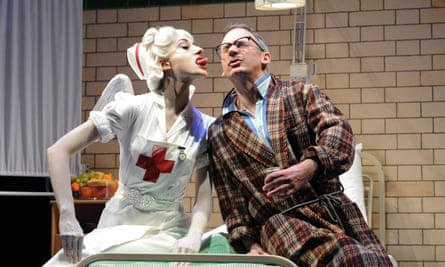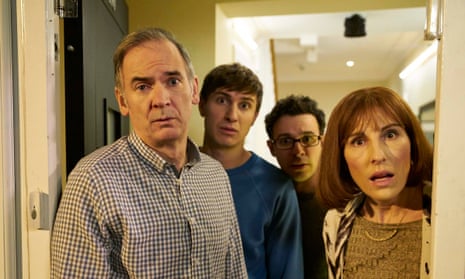The brilliant character actor Paul Ritter, who has died of a brain tumour aged 54, came to the notice of wide audiences only later in his career – as the long-haired wizard and would-be biographer Eldred Worple in the sixth of the Harry Potter film series, Harry Potter and the Half-Blood Prince (2009); as the villainous power plant worker Anatoly Dyatlov in the chilling HBO/Sky miniseries Chernobyl (2019); and, from 2011 onwards, as the combustible, inexplicably shirtless Martin Goodman in Channel 4’s Friday Night Dinner (“lovely bit of squirrel,” moving fork to mouth) with Tamsin Greig.
In all three roles he was never recognisable as whoever he really was. For Ritter was an actor who “disappeared” inside his character. He always seemed to be patiently volcanic and, on the other hand, anonymously scrofulous. When he was on stage – and he appeared often with the RSC and the National Theatre, especially – I tried, and failed, to pin down his identity. I settled for what he might really look like as the bespectacled wreck of an unsuccessful pianist in a 2005 revival of Harold Pinter’s The Birthday Party: the lone inmate of a boarding house in a resort where his father had once “nearly” come down to see him play in a concert. But that was probably just another ruse.
He took the role of Shakespeare’s great orator Ulysses in Troilus and Cressida in his underpants (Old Vic, 2000); a mysterious postman in Christmas (Bush theatre, 2003) by Simon Stephens with, said Michael Billington, “wheedling aggression …[and a] cawing, nasal voice that mixes Manchester with Mile End”; and John Major in Peter Morgan’s The Audience (Gielgud theatre, 2013), attending his weekly meeting with Helen Mirren’s Queen, as a bendy-limbed fidgeter with a sly flirtatiousness and a guilty secret of only three O-levels. The more he showed himself, the more he remained hidden, a definition, one might suggest, of all great acting. Ritter was not exactly secretive, but he let the acting do the talking.
He was born Simon Paul Adams in Kent, though both his parents hailed from Oldham, Lancashire (now Greater Manchester). His father, Kenneth Adams, who had relocated the family to Gravesend, was a fitter and turner in power stations for the Central Electricity Generating Board – he had attended the same Ward Street Central school in Oldham as Eric Sykes, whom Paul played with uncanny accuracy in a 2014 TV film about Tommy Cooper. His mother, Joan (nee Mooney), was a school secretary who had been a classmate of Bernard Cribbins. Paul had four older sisters.
He was educated at Gravesend grammar school for boys and St John’s College, Cambridge, where he took a degree in German and French. In a year abroad as part of his studies at Cambridge – where his friends and contemporaries included the actors Stephen Mangan and Paul Chahidi, the television writer Sarah Phelps, the journalist James Harding and the playwright Jez Butterworth – he walked on at the Deutsches Schauspielhaus in Hamburg.

After graduating he went back there for a year and, on returning to Britain, changed his name to Paul Ritter as there was already a Simon Adams on Equity’s books; he admired a German actor of that surname. He then went straight into regional rep and fringe theatre in London, appearing in plays at the Gate theatre, Notting Hill, and the Bush, including Snoo Wilson’s extraordinary Darwin’s Flood (1994), alongside James Nesbitt as an Ulster Jesus.
He was soon on the radar of the RSC and the Royal Court, appearing with the former in their 1996 Stratford-upon-Avon season of Troilus and Cressida and Webster’s The White Devil; and the latter in a 1998 Young Writers’ season and, in 2002, in Butterworth’s second play, The Night Heron, in which he played an intimidated policeman caught up in a farrago of sacked Cambridge college gardeners trying to take revenge on their former employers by fixing a poetry competition.
The National Theatre first came calling in 2000, when he appeared in Howard Davies’s revival of Arthur Miller’s All My Sons and Di Trevis’s beautiful staging of Pinter’s unfilmed 1978 screenplay of Proust’s Remembrance of Things Past. Subsequent NT productions included Patrick Marber’s Howard Katz and Tom Stoppard’s The Coast of Utopia, in which Ritter played Karl Marx.
Later in that decade at the National in 2007 he was a brilliantly funny Robin Day (cruel wit, cruel glasses) in Nicholas Wright’s The Reporter, directed by Richard Eyre; a hilarious, floppy-haired employee in a revival of The Hothouse, Pinter’s second play, an institutional black satire; and, in 2010, a creepy government policy wonk in Tamsin Oglesby’s Really Old, Like Forty Five, devising two-speed pavement strategies and euthanasia directives for the elderly.
His notable television appearances included an effete, sinister intelligence officer in The Game (2014), the wrong “Dave Stewart” in Bob Dylan: Knockin’ on Dave’s Door (2017, with his friend Eddie Marsan as Dylan) and a plausibly smooth Jeremy Hutchinson QC in The Trial of Christine Keeler (2019).
He loved working at the Old Vic with Matthew Warchus on that theatre’s community work in homeless shelters. He had appeared there not only as that early Ulysses but also as a safari-suited Reg – trapped in adolescent hobby-filled dreams, said Billington – in a brilliant 2008 revival of Alan Ayckbourn’s The Norman Conquests (with Mangan as the libertine librarian), which won him a Tony award nomination when it crossed the pond to New York.
Apart from the Harry Potter film, he clocked in on the Bond movie Quantum of Solace (2008); as a brutally discouraging teacher in Sam Taylor-Wood’s John Lennon biopic, Nowhere Boy (2009); and in Juan Carlos Medina’s British horror story of Victorian murders, The Limehouse Golem (2016). He last appeared on stage in a 2016 Warchus revival of his great hit, Art, by Yasmina Reza, translated by Christopher Hampton, a comedy about modernism, masculinity and friendship.
Ritter is survived his wife, Polly Radcliffe, a senior research fellow at the national addiction centre in King’s College London, whom he married in 1996, their sons, Frank and Noah, and his sisters.
Paul Ritter (Simon Paul Adams), actor, born 20 December 1966; died 5 April 2021



Comments (…)
Sign in or create your Guardian account to join the discussion